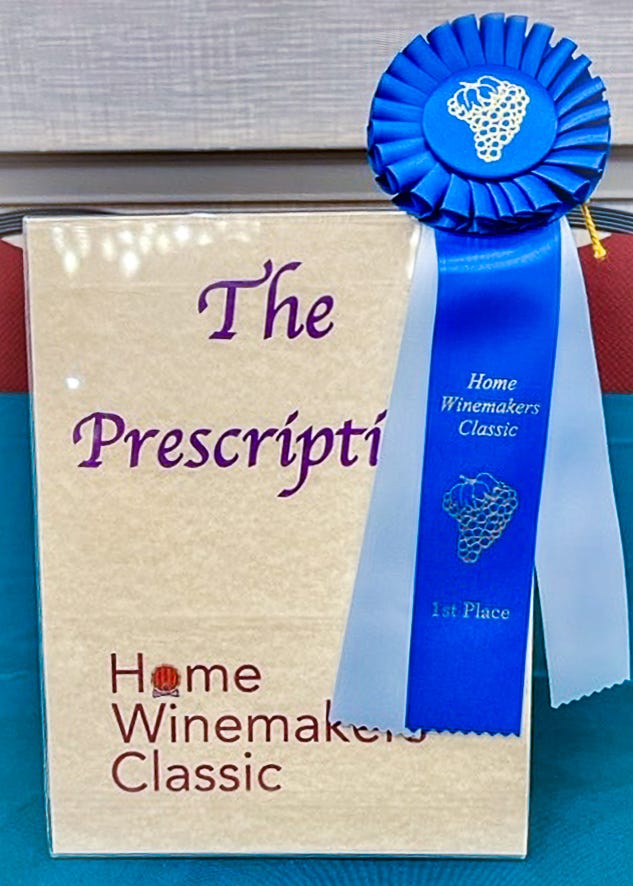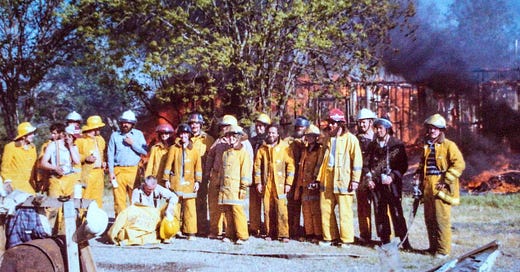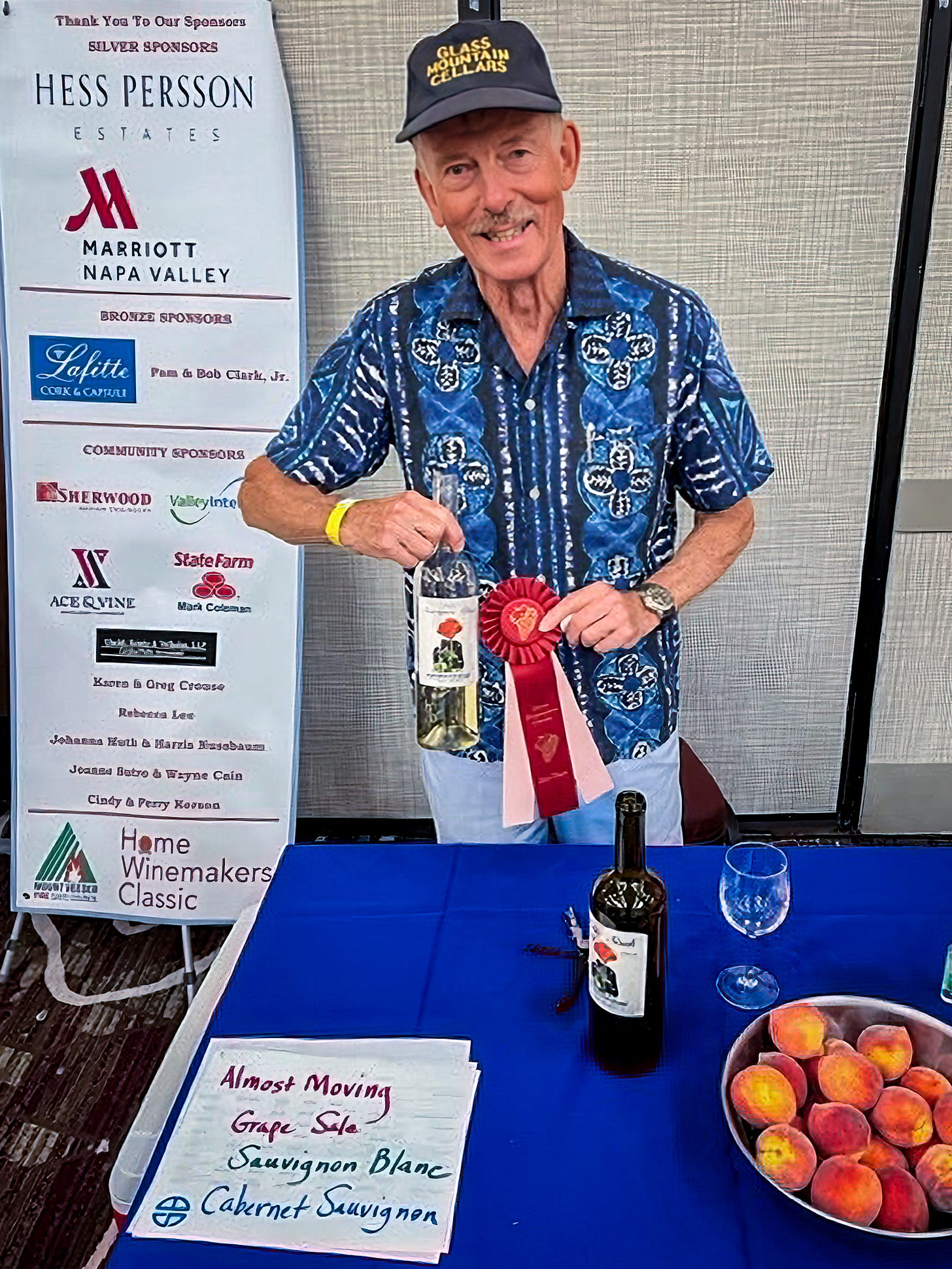NAPA, Calif. — Rex Clark will pour his own wine for the first time at the upcoming Home Winemakers Classic on Sunday, July 16, but his association with the event goes back to when he was a busy attorney in San Francisco and bought a getaway property on Mount Veeder in the Napa Valley’s Mayacamas Mountains. When a fire, the ever-present danger in the valley’s hot, dry summers, threatened his new place, the Dry Creek-Lokoya Volunteer Fire Department saved it.

Curious to learn more about the group, Clark discovered that they held an annual fundraiser to outfit the volunteers who raced at the sound of an alarm to save their neighbors’ property in the rugged western hills of the valley.
“A friend, Harris Nussbaum, told me about their fundraiser,” Clark said. “I went to it and went every year after.”
The Home Winemakers Classic, he discovered, drew together a variety of enthusiasts to pour and taste each other’s wines and to share stories and experiences.
When he was “semi-retired” and living full time in Napa, Clark started growing grapes and five years ago began making his own wine.

He had sold his Mount Veeder property by then, and he planted an acre of Bordeaux varieties plus “a little Syrah” at his home in eastern Napa.
“I learned that most of the home winemakers buy their grapes,” he said. “There must be a bit of farmer in me. I decided it’s a lot more fun to grow your own.”
His idea was to make wine from his own grapes for family and friends. His neighbor, Bernard Portet, a sixth-generation winemaker from France who founded Clos du Val Winery in Napa, helped him out with advice “although he pointed out that he was used to making thousands of gallons of wine, not just a few,” Clark said.
“It’s said that it takes about five or six years to become a decent winemaker,” he said. “I believe it. Until you start making our own wine, you don’t appreciate the skill it takes.”
This year, after his wife tasted his latest wine, she encouraged him to take it to the Home Winemakers Classic.
“She said, ‘We’ve paid good money for worse,’” he said. “I like that. It might become the name of the wine.”
After years of trying others’ creations, he said, “I’ll see what happens” when he pours his own at the Classic.
The evolution of the Classic
The 40th Home Winemakers Classic is no longer a fundraiser for the Dry Creek-Lokoya Volunteer Fire Department. Napa County Fire now provides funds for the volunteer firefighters’ equipment. But the event, which goes back to a decision to include women on the force, endures.
When he joined the Dry Creek-Lokoya team in 1978, Gary Green, the now-retired former fire chief, said the department had already become the first volunteer firefighter organization in California to include women.
“It made sense,” he said of the decision to train women as well as men to fight fires.
Bonnie McCombs’ husband was the assistant fire chief for the Dry Creek-Lokoya, and she became the first woman to train with the men in the 1970s. In a phone interview from her home in Mexico she recalled the early days of firefighting.
“How it started was that the men were the firefighters, but during the day they were mostly off at work,” McCombs, now 80, said. “When an alarm went off, they had to drive to a shed to get a unit. We didn’t have a fire house then, but we had two units and two sheds, one on Redwood Road and one on Dry Creek Road. It took a long time for them to get there. They did mostly wildland firefighting because a lot of times by the time the firefighters got there the structure would be gone.
“Well, some of the wives said when the alarm goes off we — the women who were around — thought at least we (could) go get the engines going. Then it was: Why don’t we pull the units out of the shed? Then we said, ‘Why don’t we just meet you at the fire?’ Then, as long as we were here, we figured we might as well pull out the hose. One thing led to another and we were fighting fires.”

They trained with the Napa County forestry division, which at first held separate trainings for the women.
“I didn’t see the point of that,” McCoombs said. “We were all fighting fires together.”
McCoombs recalled no problems with unequal treatment or harassment “unlike another place, which will not be named, where the chief said he’d only let women in ‘over my dead body.’ We had great camaraderie. There were about 60 men and 40 women, and not all of them were couples.”
Firefighting was, however, serious and often dangerous, said McCoombs, who described harrowing episodes during the 1981 Atlas Peak fire.
“I almost lost my life.”
The women proved to be an asset in another way: Fundraising, as well as firefighting, fell to them. At that time the volunteer group was responsible for outfitting themselves.
“The forestry division gave us their castoff units,” she said, “but anything auxiliary we had to get ourselves. Also, we had to do something to build a station. My husband designed a building, and I was in charge of fundraising.”
At first they held rummage sales and bake sales, McCoombs said, and once they tried an Octoberfest.
“But these didn’t bring in a lot of money,” she said. “Then someone said wine-tasting was bringing in money, and there were a lot of home winemakers. We started planning before we found out it wasn’t legal for home winemakers who weren’t bonded to sell their wines.”
But out of this came the idea of home winemakers gathering to taste each other’s wines, culminating in a judging and awarding of ribbons. Domaine Chandon offered to host the first event in 1982.
“That first year was pretty funny,” McCoombs said. “I remember people coming in carrying cardboard boxes of wines. One man hadn’t put on his labels yet, so he was sticking them on bottles with gum. But it was a lot of fun. And from there it just grew.”

The Classic today
While the home winemakers couldn’t sell their wine, they raised funds from the tickets sold, and wineries began contributing wines for an auction. In time they got their station.
With a chuckle, Green recalled conversations with the county in 2020.
“Maybe it was kind of embarrassing that we were holding fundraisers,” he said. “They asked ‘How much would it take to get you to stop fundraising?’”
Green subsequently secured an annual budget of $12,000 for his team before he retired.
“But we had this great fundraiser in place,” he said, and no one, neither the winemakers nor the guests, wanted to see it cease. Instead, the Classic continues as a fundraiser for the Mount Veeder Fire Safe Council, which works to reduce fire risk in that high-risk area.
This year the funds raised will go to the Neighbors in Need program to help people who can’t afford to have the work done to make their property safe, Green said.
"By helping area residents reduce fire fuels and create defensible space, these donations help make our entire community safer,” said Cindy Kerson, event chairwoman for 2023.
Although he is retired, Green stays involved with the fundraiser. But he said 40 years of sampling other peoples’ wine has still not made him want to try to make his own.
“I’m a wine drinker, not a wine maker,” he said.
The 40th annual Home Winemakers Classic, 4:30 p.m. to 6 p.m. on Sunday, July 16, at the Napa Valley Marriott Hotel & Spa. Tickets are $50 in advance and $60 at the door. In addition to tasting wines, guests can also bid on wines from some of Napa Valley’s top wineries, including Harlan, Silver Oak and Hall, in an expansive silent auction that features dining, entertainment and luxury items. For more information and to purchase tickets, visit here.
Sasha Paulsen is a novelist and journalist living in Napa.







As always Sasha brings us another addition to “Napa Strong.” Thanks.
Write on!